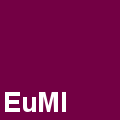
The Program
Educational Goals
The University of Trento (Italy), the RWTH Aachen University (Germany), and the University of Edinburgh (Scotland) offer a two year (120 ECTS credits) Joint Master’s Programme, named European Master in Informatics (EuMI). The objective of the Master’s Programme is to educate professionals who will understand advanced techniques, tools, and methodologies in the field of Computer Science, and who will be able to put this knowledge to practice in the key application domains of Net-Centric/Media Informatics, Life Science Informatics, and Embedded Systems Informatics. The Programme will admit a maximum number of 50 students for the academic year 2010/2011 and 2011/2012.
Structure of the Programme
For each area of specialization, a joint curriculum is specified which involves two universities of the Consortium. The student admitted to a selected curriculum will study in two universities, taking courses on advanced topics in theoretical and practical Computer Science, and with a focus on the chosen area of specialization. The student will spend half of his/her Master’s course in one university (the "first university"), and the other half in the other university (the "second university"). Work towards the thesis will be carried out at the second university will be jointly supervised and evaluated by two professors, one from each visited university.
Description of the Programme
The objective is to educate professionals who will understand advanced techniques, tools, and methodologies in the field of Computer Science, and who will be able to put this knowledge to practice in key application domains. In particular, EuMI offers three areas of specialization in
- Net-Centric / Media Informatics This specialization covers all those aspects of informatics related to the design, implementation and analysis of distributed, ubiquitous information and computing systems. This area covers a wide range of topics, ranging from network architectures and communication infrastructures to techniques for the design and analysis of distributed knowledge, media applications, intelligent human computer interfaces and distributed web-service applications.
- Life-Science Informatics This area of specialization will prepare professionals for research or employment at the intersection of the study of Life Science (biology, neuroscience, cognitive science) and the study of computation and engineering. Students will take basic courses on the fundamentals of biology and/or cognitive science and advanced courses studying the application of computer science techniques to the analysis of structural and behavioral aspects of biological and cognitive systems.
- Embedded Systems Informatics This specialization introduces the fundamental principles underlying the theory and the practical design and implementation of embedded systems. Moreover, it allows students to put these principles into practice in applications in the area of control systems (e.g., controllers for automotive systems or industrial plants) and to ambient intelligence applications (e.g., domotics or sensors networks).
These are application domains that, being emergent, rapidly evolving, and of growing impact on society, require specialized competencies not covered by more traditional degree programmes.
Duration of Studies
The EuMI Course has a duration of two academic years full-time, starting in September 2010.
Learning outcomes
EuMI aims to train students in emerging research domains with a high potential impact to shape the future of applied computer science disciplines. It prepares students for employment in such multidisciplinary areas and/or for continuing their studies within PhD programmes.
After completing the EuMI programme the student will possess the competencies necessary for the design and implementation of complex computational systems, including their embedding in a socio-technical context. The student will acquire knowledge in both theoretical and applied Computer Science, which will allow him/her to adapt quickly to changes in this constantly evolving field, and specific competencies necessary to operate in the chosen area of specialization. The student will also attain expertise in putting his/her knowledge into practice by participating in laboratory projects and/or in industrial student placement schemes. Moreover, the student will attain practical project management skills which are necessary for an effective application of the knowledge acquired.
During his/her studies, the student will work within research groups of three leading European universities, and will interact with professors, researchers and scholars working in advanced computer science research in and associated enabling technologies.
The international dimension of the Master’s Course guarantees that students familiarize themselves with different educational methods and a multicultural education through the immersion in two different European universities and two different countries.
Graduation thesis
Work towards the thesis will be carried out at the second university will be jointly supervised and evaluated by two professors, one from each visited university.
Master's degree
Upon the successful completion of the curriculum and fulfillment of the Master’s course requirements (120 ECTS), students will be awarded a qualification equivalent to Master's degrees in the two visited universities. The awarded degree corresponds to:
- a Master of Science in Computer Science or Media Informatics from the RWTH Aachen University
- a Master of Science in Informatics from the University of Edinburgh
- a Master of Science (Laurea Magistrale) in Informatics from the University of Trento
Language
All courses are taught in English. Students will also undertake courses on the culture and language of the European countries of the two universities, whenever English is not the officially spoken language.
Individual study plans and Tutoring
Each student will have the possibility to create her/his own study plan which must conform to the EuMI School rules and be approved by the EuMI Multilateral Committee. Each first-year student is assigned a tutor that assist in the organization of her/his educational activities.


